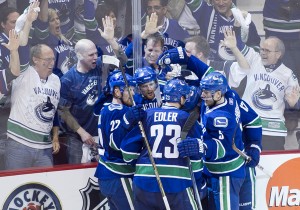Somewhere out there is the new Vancouver Canucks General Manager, and the inevitable selection is getting closer. Whomever the successful applicant is, they will have a long list of things to review in a relatively short period of time, and draft selection criteria is one of them.
I have done an article recently on the need for the Canucks to take a hard look at the Scouting staff, but that’s just step one when it comes to the future drafting of players. The first step is to change the staff, but the second step is to change the whole process of how they select players.

The easy way, the long established way that still gets the most use, is to look at the classic stats that the individual produces. Goals, Assists, Penalty Minutes, Plus/Minus and so forth.
But this is an antiquated line of thinking, and far too many people put far too much stock in this type of evaluation. It’s vital that the Canucks look much harder into some intangibles that are critical in determining the true worth of the player, but are either skimmed over briefly, or ignored completely.
The Player Agent
The player’s agent is extremely important, but not just to the player himself. A General Manager is going to spend a lot of time in contact with the agent, most importantly during the contract negotiation period. This window of time alone can make or break the relationship between the player and the team, and affect the whole team’s performance.
A long, acrimonious negotiation builds resentment in the player, and his performance suffers as a result of the impression that the team doesn’t really care about him. Whether or not the player should feel that way is irrelevant, because it happens with regularity. As a result, the team suffers and a distraction has officially emerged.
But the communication isn’t limited there, often agents talk to GM’s requesting various things for the player. This can range from anything like a request for tickets for family members, to more sensitive issues like more playing time.
Clearly, a GM and an agent must have a good working relationship, or at least be able to manufacture a professional one. Mark Gandler, who handled Alexi Yashin among others, has a reputation as being extremely unpopular among front offices around the NHL, for being unpleasant and difficult to work with. This reputation was largely earned while negotiating Yashin’s contract with Ottawa and the Islanders. An agent like that is a problem GM’s don’t need, so teams need to know who they’re going to be dealing with for the foreseeable future, because if the player is represented by an agent who is heralded for his ability to make people dislike him, teams need to walk away.
The Parents
Parents should be a huge factor when deciding on who you want to draft. Anyone who is unsure of that need look no further than Bonnie and Carl Lindros, Eric’s parents and agents.
You want to find a player who has concerned parents that want to look out for their son’s wellbeing, that behaviour is normal and healthy. In Lindros’ case, his parents were unable to detach and be objectionable, and became a nightmare to the Flyer’s front office with demands on everything from playing time to line-mates.
Canuck fans may be more familiar with the Cody Hodgson saga, in which similar issues apparently arose with his parents being too involved in his career. That ended badly, and he was shipped out to Buffalo in a trade that seemed to come out of nowhere for fans, and brought Zach Kassian in return. That trade wasn’t popular with the Canuck faithful at first, but Kassian seems to be gaining popularity and his play is improving.
Every player has parents, but it is extremely important to find ones that will always look out for their son or daughter, but will stay in the background and allow the right people to handle the business side of things.
Friends
A person is a product of their environment, so whomever a player hangs out with matters. They don’t have to be the “right” people as defined by the many teen dramas populating the airwaves, but they do have to be the right people as far as character and behaviour.

It would be great if they volunteered at an animal shelter and worked with the homeless during major holidays. But you could settle for friends that take school somewhat seriously, don’t have a criminal record and don’t party like Motley Crue on the weekends.
Friends are into drugs? Long list of offences and are known to Police? Haven’t seen the inside of a school in 6 months but are only 17? These are major red flags, because if a player’s friends are into an unhealthy lifestyle, you can be certain your player is too.
To think you are going to draft the sole voice of reason in that group of friends, and that he isn’t influenced by them in any way, is pure delusion. If he hangs out with criminals, you are drafting a criminal, and it will come back to haunt you. Unfortunately, there are no shortage of examples to support that theory in the sporting world.
The Player Himself
And of course, that brings us to the player being sought after. Sure, you know his stats, but that is the easy part. What type of person are you really drafting? A formal interview in the classic setting in the team’s office is nothing but the starting point. Anyone can put on a suit and say the right things once, any agent worth his salt will have a player prepared for that.
You need to talk to the player in his home, see how he interacts with his parents. What is the family dynamic like? Is he respectful to his parents and siblings? A person can only hide who they are for so long, and the more you talk to someone, the more you see who they really are.
Talk to the player at his school and see how he interacts in that environment, because it doesn’t take long to tell if your player is an ego driven jock who thinks he is entitled, or if he is humble and well liked. Talk to some teachers, get a bigger picture.
And then there is the arena. Not the performance on the ice, you’ve already got that part figured out. What’s he like with fans and the autograph seekers? Because if he’s good enough for you to consider drafting, he’s going to have fans around him, and how he treats them speaks volumes about him.
Certainly, talking to coaches is important too. They can be biased, but there is probably good information to be heard in between the speeches the coach is giving as he sings his praises. And fellow players, though also probably biased to a degree themselves, can give you some insight as to what he’s like as a teammate when things are bad, and any leadership qualities he might display off the ice.
The Final Verdict
If all this seems like a lot of work, it’s because it is. And considering what you are trying to accomplish, and how important draft picks are to the team’s success both on the ice and off, this kind of time investment should be the standard.
When you think of the financial commitment alone that you may be making to the player, this kind of detective work shouldn’t be viewed as excessive, it should be the minimum amount of effort you are willing to exert.
This type of plan won’t be easy to execute, and it will likely involve hiring an extra person or two in order to enact it. But considering what’s at stake, I think the benefits will be well worth the time spent.